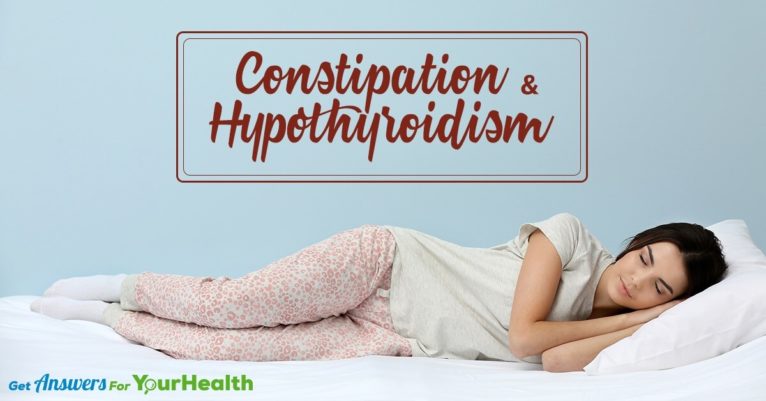1) Grab a FREE copy (Value $14.95) of one of my books Thyroid Symptom Overload
Just pay shipping $7.95 for any US orders. Or, if you want to pay full price plus shipping, order from Amazon :)
2) Take our Thyroid Quiz today and find out what "Thyroid Type" you have
This quiz will help you quickly discover where your symptoms are stemming from.
3) Join Our Thyroid Advocate Membership Site - Natural Thyroid Academy
FREE for a limited time. No credit card required.
4) Work with me and my team privately
Schedule your FREE 15 minute phone consultation and we can find out the best way to help you specifically.
Some of the heartiest laughs and fodder for jokes are shared at the expense of an awkward and embarrassing subject such as constipation. Fun and games aside, at a certain point, things can take a pretty serious turn when constipation occurs on a regular basis. People diagnosed with hypothyroidism are at higher risk for developing chronic constipation.
What Is Hypothyroidism?
Hypothyroidism is the condition that afflicts around 300 million people worldwide. Hypothyroidism, as the prefix hypo suggests; is a disorder causing decreased thyroid functioning. It is characterized by insufficient production of certain important hormones which are normally produced by the thyroid gland.
The thyroid gland is a small, butterfly shaped gland at the base of your neck which produces triiodothyronine (T3) and thyroxine (T4). These hormones are responsible for maintaining the metabolism of your body. The metabolism is the rate at which your body uses fats and carbohydrates to carry out its normal functioning and generate energy.
➢ Who Is More Likely To Have Hypothyroidism?
The female gender, especially those 40-60 years of age are more likely to be afflicted by this disorder. It may occur even in younger age groups, although the incidence is comparatively low.
With time, a plethora of symptoms start to materialize, which include: constipation, fatigue, insensitivity to cold, depression, dry skin, weight gain, impaired menstrual cycle, puffiness and various others.
➢ How Does Hypothyroidism Progress?
Hypothyroidism may result in advanced hypothyroidism that is known as myxedema, which is rare and can be life-threatening. In other cases, constant stimulation may also result in an enlarged state of the thyroid gland, known as a goiter.
➢ Diagnosis of Hypothyroidism:
▪ Hypothyroidism is a confusing state, in which the suffering individual is unsure about why he is experiencing the aforementioned symptoms. It is usually diagnosed during a routine annual screening check-up.
▪ One of the major symptoms that provokes a person to get themselves checked is constipation, which is going to be the main discussion in the rest of this article.
Constipation and Hypothyroidism:
Constipation is a malady which has a specific description. In order for a person to complain of constipation, he or she should have been experiencing 3 or less bowel movements in a week. Additionally, these bowel movements should be unproductive and quite painful to be labeled as constipation. Normally, a person can have as many as four to twenty stools a week without being constipated.
Constipation can be very annoying and cause discomfort to an individual. More so, it becomes a source of public embarrassment for a person, especially during vacation. It may also make the person a laughing stock in places such as work or school, in cases where the person spends too much time in the bathroom, and later on looks for weak excuses to explain his or her prolonged absence.
➢ How Does Hypothyroidism Cause Constipation?
* Normally, muscles line the whole length of the digestive tract, which helps in the movement of fecal material or stool through the large intestines. These muscles contract to aid the stool to pass from the intestines into the rectum and out of the body. These movements are at the rate at which optimal amounts of water are absorbed by the stool, which gives them a soft but solid consistency. In turn, this helps in their easier expulsion from the digestive tract.
* Hypothyroidism results in poor metabolism and inability of the digestive tract muscles to contract effectively. This results in slow and sluggish movements of stool which results in more amounts of water being absorbed from the stool. The increased absorption of water leaves behind the stools as hard and dry, which limits their movement from the digestive tract.
* Another lesser-known connection between hypothyroidism and constipation is that constipation results in elevated levels of certain hormones. This is caused due to reduced ability of the body to clear out hormones from the body system. One such hormone is estrogen, whose amount increases in the body. In turn, this results in decreased amounts of free thyroid hormone in the body, thus deteriorating the whole scenario.
➢ How Does Constipation Present?
▪ In addition to the reduced frequency of stools, there are many other symptoms that women and men may suffer from. The person may experience some amounts of abdominal bloating and distention, nausea, vomiting, cramps, or gas and flatulence.
▪ The longer trips to the toilet impart feelings of helplessness, in which the person strains hard to pass out the unwanted stools. This excessive straining results in additional discomfort and pain and can cause further problems.
➢ Complications Of Hypothyroidism Induced Constipation:
▪ Constipation is known to be the reason for anorectal fissures, which are painful tears in the skin of the anal region. These tears can be deep enough to involve the mucosa, which is the wet lining of the rectum. Pain and bleeding in the form of fresh blood ensues.
▪ Another almost similar complication is that of hemorrhoids, which can be external or internal. They are also associated with pain and bleeding.
▪ There are other more alarming complications of constipation that are often missed, which includes cancerous polyps. Chances of these polyps being spotted are increased when a person suffering from hemorrhoids goes in for a check-up. At the same he/she is encouraged to undergo a colonoscopy.
▪ The colonoscopy might also be able to reveal the presence of diverticulosis, which are basically pouches in the wall of the colon. An early diagnosis of these findings may be a matter of life or death for an individual.
How To Beat Hypothyroidism Induced Constipation?
In the battle against hypothyroidism and its embarrassing symptoms, it is essential to treat both the root cause and the symptoms (as additional aid in the form of symptomatic treatment). We have listed below the choices which act as our weapons when we wage a war against hypothyroidism and constipation.
➢ Thyroid Treatment:
In allopathic medicine, the gold standard of treatment for hypothyroidism is levothyroxine. The levothyroxine drug contain T4 thyroid hormone, which mimics our normal body processes and is converted into the active T3 hormone in the liver. After diagnosis, the next step will involve the doctor prescribing the appropriate dosage of levothyroxine drugs. Blood work is closely monitored to measure TSH in the blood. However, many women notice that they still have symptoms even while on the prescribed medications from their doctor or specialist.
➢ Fiber-Rich Foods:
Another way to relieve the symptom of thyroid associated constipation is to eat a diet high in fiber. On an average, around 20 to 35 grams of fiber is sufficient to fulfill the needs of an adult. Any lower than this, and you might find yourself complaining of abdominal distention, cramps, and constipation. It is a good idea to increase your knowledge about foods rich in fiber such as fruit and vegetable, and integrate them into your daily diet.
➢ Gluten and Thyroid:
Gluten and thyroid have a connection, which is due to a simple case of mistaken identity. The protein part of gluten, known as gliadin, resembles the thyroid gland. Normally, gliadin is not needed by the body and it is tagged by the immune system to be destroyed. Sometimes, the immune system destroys the thyroid tissue, mistaking it for gliadin. This can be combated by cutting down on gluten foods such as pasta, crackers, pretzels, and breads.
➢ Magnesium:
Magnesium has proven to be of real help in resolving constipation. It acts as a relaxation mineral that relaxes the blood vessels and muscles lining the digestive tract. This helps in the easy passage of stools.
A diet rich in magnesium containing foods has been shown to be of considerable help. Additional supplementation may also be needed according to the state of deficiency. The recommended daily dosage (RDA) is 300 mg, which can be increased to 400-100 mg according to the need. It can be started as one pill of magnesium oxide or citrate before bed. Talk to your doctor before taking any supplements.
➢ Bowel Retraining:
Bowel retraining is a lifestyle modification that should be turned into a habit. It is a strategy to help you take charge of your bowel habits. This mainly involves establishing regular bowel habits with a fixed time to save yourself from the complications of constipation. Also, it involves avoiding excessive straining and holding your bowels when you feel the need to go. The use of a Squatty Potty can also help in relaxing the muscles of the bowel during bowel movement.
➢ Biofeedback:
Considering biotherapy might be a helpful step in getting rid of constipation. AGMA has developed some guidelines for the biofeedback. This therapy instills the ability in people to learn to relax their pelvic floor muscles. This can help in improving overall bowel habits, and achieve regularity.
➢ Probiotics:
Funnily enough, probiotics are microscopic, living organisms inside the digestive tract that are presented in fermented foods. They encourage easy digestion and absorption of food. It is a wise choice to take more foods containing these busy little workers, or supplements containing different strands of probiotics.
Conclusion:
Hypothyroidism is a disorder that sucks the energy out of any individual, leaving them tired, depressed and unable to make sense of symptoms they are experiencing. Constipation is one of the symptoms, which starts off as mere discomfort and pain, but things can escalate when cancerous polyps and colorectal cancer is discovered. Please talk to your doctor if you suspect thyroid problems and the suffer from the symptoms of constipation.
References:
https://www.mayoclinic.org/diseases-conditions/hypothyroidism/symptoms-causes/syc-20350284
http://www.nejm.org/doi/full/10.1056/NEJM200107263450406
http://annals.org/aim/article/706728/levothyroxine-therapy-patients-thyroid-disease
http://www.primarycare.theclinics.com/article/S0095-4543(05)70054-3/abstract
https://patient.info/health/underactive-thyroid-gland-hypothyroidism
https://www.uptodate.com/contents/hypothyroidism-underactive-thyroid-beyond-the-basics
https://www.ncbi.nlm.nih.gov/pubmed/21975961








